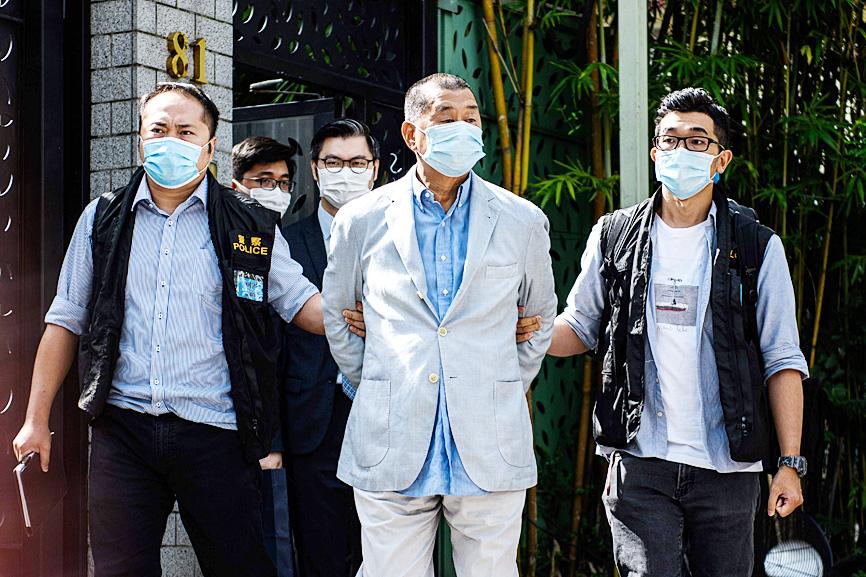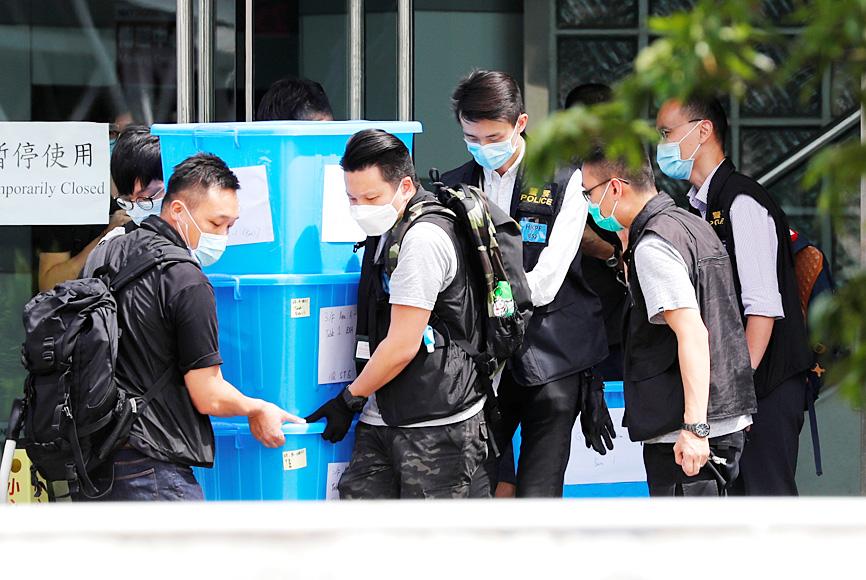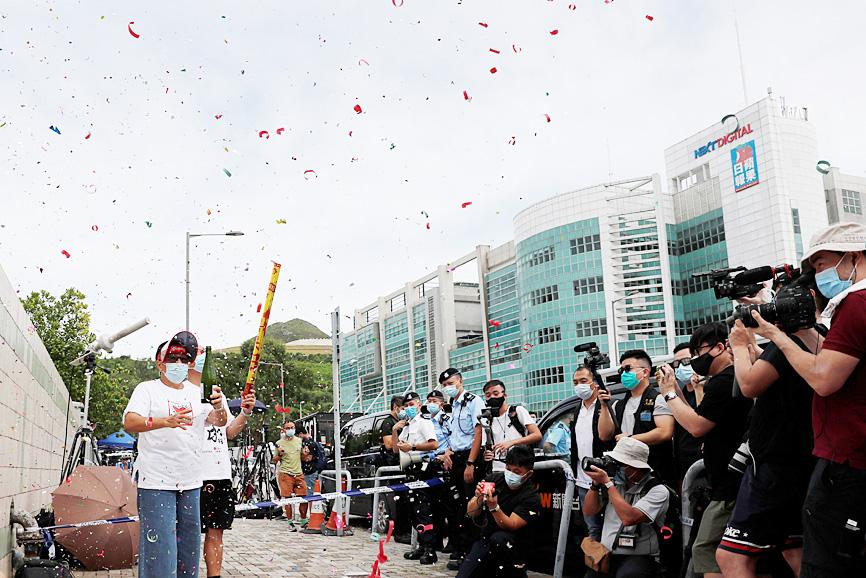Hong Kong authorities yesterday broadened their enforcement of a new National Security Law, arresting tycoon Jimmy Lai (黎智英), searching the headquarters of his Next Digital (壹傳媒) group and carting away boxes of what they said was evidence.
The police action marked the first time the law was used against news media, stoking fears that authorities are suppressing press freedom.
Next Digital operates the Chinese-language Apple Daily, which last year frequently urged readers to take part in the anti-government protests.

Photo: AFP
Hong Kong police arrested Lai, 71, yesterday morning, an aide to the businessman said, in the highest-profile detention under the new law since it took effect on June 30.
Mark Simon, a Next Digital executive and Lai’s aide, said Lai was charged with collusion with foreign powers.
He said police searched the homes of Lai and two of his sons and detained four other members of the media company.

Photo: Reuters
Hong Kong police said they arrested at nine men and one woman between the ages of 23 and 72 on suspicion of violating the new security legislation, with offenses including collusion with a foreign country and conspiracy to defraud.
They did not release the names of those arrested or provide further details of the charges.
However, the pro-democracy Stand News Web site reported that Lai’s eldest son, Lai Kin-yan (黎見恩), was wanted for conspiracy to defraud, while his second son, Lai Yiu-yan (黎耀恩), was wanted for colluding with foreign countries or foreign forces to endanger national security.

Photo: Reuters
Following Jimmy Lai’s arrest, about 200 police raided Next Digital’s headquarters, cordoning off the area, searching desks and at times getting into heated exchanges with staff.
What police were looking for in the building was not clear, although they later said they took away 25 boxes of evidence for processing.
Jimmy Lai, who was arrested at his mansion in Kowloon, was also brought to Next Digital’s headquarters, where he remained for about two-and-a-half hours before police took him away in a car.
“We are completely shocked by what’s happening now, with the arrest and followed by the ongoing raid inside the headquarters of Next Digital,” Hong Kong Journalists Association chairman Chris Yeung (楊健興) said.
“With the passage of the National Security Law and the really tough powers given to the police in their operations, we have seen now what we call ‘white terror’ become a reality, which will affect media organizations and journalists’ reporting,” Yeung said.
Police unblocked Next Digital’s offices at mid-afternoon, with police Senior Superintendent Steve Li Kwai-wah (李桂華) saying that staff were free to resume their work.
The share price of Next Digital soared more than 200 percent in the afternoon, following posts on a popular online forum encouraging investors to support the company by buying its stock.
Additional reporting by staff writer

‘FORM OF PROTEST’: The German Institute Taipei said it was ‘shocked’ to see Nazi symbolism used in connection with political aims as it condemned the incident Sung Chien-liang (宋建樑), who led efforts to recall Democratic Progressive Party (DPP) Legislator Lee Kun-cheng (李坤城), was released on bail of NT$80,000 yesterday amid an outcry over a Nazi armband he wore to questioning the night before. Sung arrived at the New Taipei City District Prosecutors’ Office for questioning in a recall petition forgery case on Tuesday night wearing a red armband bearing a swastika, carrying a copy of Adolf Hitler’s Mein Kampf and giving a Nazi salute. Sung left the building at 1:15am without the armband and apparently covering the book with a coat. This is a serious international scandal and Chinese

PERSONAL DATA: The implicated KMT members allegedly compiled their petitions by copying names from party lists without the consent of the people concerned Judicial authorities searched six locations yesterday and questioned six people, including one elderly Chinese Nationalist Party (KMT) member and five KMT Youth League associates, about alleged signature forgery and fraud relating to their recall efforts against two Democratic Progressive Party (DPP) legislators. After launching a probe into alleged signature forgery and related fraud in the KMT’s recall effort, prosecutors received a number of complaints, including about one petition that had 1,748 signatures of voters whose family members said they had already passed away, and also voters who said they did not approve the use of their name, Taipei Deputy Chief Prosecutor

UNDER ATTACK: Raymond Greene said there were 412 billion malicious threats in the Asia-Pacific region in the first half of 2023, with 55 percent targeting Taiwan Taiwan not only faces military intimidation from China, but is also on the front line of global cybersecurity threats, and it is taking action to counter those attacks, President William Lai (賴清德) said yesterday. Speaking at the opening of this year’s Cybersec Expo in Taipei, the president assured foreign diplomats and exhibitors that Taiwan remained committed to strengthening its defense against cyberattacks and enhancing the resilience of its digital infrastructure. Lai referenced a report from the National Security Bureau (NSB) indicating that the Government Service Network faced an average of 2.4 million intrusion attempts daily last year, more than double the figure

COUNTERINTELLIGENCE TRAINING: The ministry said 87.5 percent of the apprehended Chinese agents were reported by service members they tried to lure into becoming spies Taiwanese organized crime, illegal money lenders, temples and civic groups are complicit in Beijing’s infiltration of the armed forces, the Ministry of National Defense (MND) said in a report yesterday. Retired service members who had been turned to Beijing’s cause mainly relied on those channels to infiltrate the Taiwanese military, according to the report to be submitted to lawmakers ahead of tomorrow’s hearing on Chinese espionage in the military. Chinese intelligence typically used blackmail, Internet-based communications, bribery or debts to loan sharks to leverage active service personnel to do its bidding, it said. China’s main goals are to collect intelligence, and develop a